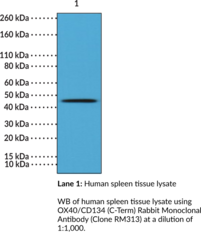Territorial Availability: Available through Bertin Technologies only in France
- Correlated keywords
- OX-40 RM-313 TNFRSF-4 L TRAF NF?B CD4 + CD-4+ CD8 8+ 134
- Product Overview:
OX40, also known as TNF receptor superfamily member 4 (TNFRSF4), is a type I transmembrane glycoprotein and the cognate receptor for the T cell co-stimulatory molecule OX40L (TNFSF4; Item No. 32065).{59402} OX40 assembles into trimers, with each monomer containing three cysteine-rich domains (CRDs) that bind OX40L and a cytoplasmic tail that interacts with TNF receptor-associated factor 1 (TRAF1), -2, -3, and -5 to induce a variety of intracellular signaling cascades, including NF-?B, ERK, PI3K, and Akt pathways.{52886,59402} OX40 is transiently expressed on CD4+ and CD8+ T cells in response to antigen stimulation in humans and is localized to lipid rafts.{57029,59402} Binding of an OX40 trimer to trimeric OX40L, expressed by antigen-presenting cells (APCs), including dendritic cells (DCs), macrophages, and B cells, forms a hexameric OX40-OX40L complex that promotes effector T cell phenotype and function, proliferation, survival, and memory.{57029} Increased OX40 levels have been found in inflamed tissues isolated from patients with a variety of autoimmune diseases, including multiple sclerosis, systemic lupus erythematosus (SLE), or rheumatoid arthritis.{57029} Cayman’s OX40 (C-Term) Rabbit Monoclonal Antibody can be used for immunohistochemistry (IHC) and Western blot (WB) applications.
Cayman Chemical’s mission is to help make research possible by supplying scientists worldwide with the basic research tools necessary for advancing human and animal health. Our utmost commitment to healthcare researchers is to offer the highest quality products with an affordable pricing policy.
Our scientists are experts in the synthesis, purification, and characterization of biochemicals ranging from small drug-like heterocycles to complex biolipids, fatty acids, and many others. We are also highly skilled in all aspects of assay and antibody development, protein expression, crystallization, and structure determination.
Over the past thirty years, Cayman developed a deep knowledge base in lipid biochemistry, including research involving the arachidonic acid cascade, inositol phosphates, and cannabinoids. This knowledge enabled the production of reagents of exceptional quality for cancer, oxidative injury, epigenetics, neuroscience, inflammation, metabolism, and many additional lines of research.
Our organic and analytical chemists specialize in the rapid development of manufacturing processes and analytical methods to carry out clinical and commercial GMP-API production. Pre-clinical drug discovery efforts are currently underway in the areas of bone restoration and repair, muscular dystrophy, oncology, and inflammation. A separate group of Ph.D.-level scientists are dedicated to offering Hit-to-Lead Discovery and Profiling Services for epigenetic targets. Our knowledgeable chemists can be contracted to perform complete sample analysis for analytes measured by the majority of our assays. We also offer a wide range of analytical services using LC-MS/MS, HPLC, GC, and many other techniques.
Accreditations
ISO/IEC 17025:2005
ISO Guide 34:2009
Cayman is a leader in the field of emerging drugs of abuse, providing high-purity Schedule I-V Controlled Substances to federally-licensed laboratories and qualified academic research institutions for forensic analyses. We are certified by ACLASS Accreditation Services with dual accreditation to ISO/IEC 17025:2005 and ISO Guide 34:2009.





